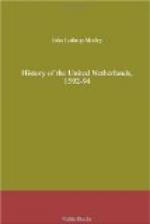Early in 1593 Mayenne, yielding to the pressure of the Spanish party, reluctantly consented to assemble the States-General of France, in order that a king might be chosen. The duke, who came to be thoroughly known to Alexander Farnese before the death of that subtle Italian, relied on his capacity to outwit all the other champions of the League and agents of Philip now that the master-spirit had been removed. As firmly opposed as ever to the election of any other candidate but himself, or possibly his son, according to a secret proposition which he had lately made to the pope, he felt himself obliged to confront the army of Spanish diplomatists, Roman prelates, and learned doctors, by whom it was proposed to exclude the Prince of Bearne from his pretended rights. But he did not, after all, deceive them as thoroughly as he imagined. The Spaniards shrewdly suspected the French tactics, and the whole business was but a round game of deception, in which no one was much deceived, who ever might be destined ultimately, to pocket the stakes: “I know from a very good source,” said Fuentes, “that Mayenne, Guise, and the rest of them are struggling hard in order not to submit to Bearne, and will suffer everything your Majesty may do to them, even if you kick them in the mouth, but still there is no conclusion on the road we are travelling, at least not the one which your Majesty desires. They will go on procrastinating and gaining time, making authority for themselves out of your Majesty’s grandeur, until the condition of things comes which they are desiring. Feria tells me that they are still taking your Majesty’s money, but I warn your Majesty that it is only to fight off Bearne, and that they are only pursuing their own ends at your Majesty’s expense.”
Perhaps Mayenne had already a sufficiently clear insight into the not far-distant future, but he still presented himself in Spanish cloak and most ultramontane physiognomy. His pockets were indeed full of Spanish coin at that moment, for he had just claimed and received eighty-eight thousand-nine hundred dollars for back debts, together with one hundred and eighty, thousand dollars more to distribute among the deputies of the estates. “All I can say about France,” said Fuentes, “is that it is one great thirst for money. The Duke of Feria believes in a good result, but I think that Mayenne is only trying to pocket as much money as he can.”
Thus fortified, the Duke of Mayenne issued the address to the States-General of the kingdom, to meet at an early day in order to make arrangements to secure religion and peace, and to throw off the possible yoke of the heretic pretender. The great seal affixed to the document represented an empty throne, instead of the usual effigy of a king.
The cardinal-legate issued a thundering manifesto at the same time sustaining Mayenne and virulently denouncing the Bearnese.
The politicians’ party now seized the opportunity to impress upon Henry that the decisive moment was come.




